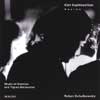Komitas; Mansurian Works for Viola and Percussion
A contemporary composer – and musicians – in touch with a tragic past
View record and artist detailsRecord and Artist Details
Composer or Director: Sogomon Komitas, Tigran Mansurian
Genre:
Chamber
Label: ECM New Series
Magazine Review Date: 10/2003
Media Format: CD or Download
Media Runtime: 54
Mastering:
Stereo
Catalogue Number: 461 831-2

Tracks:
| Composition | Artist Credit |
|---|---|
| Havik |
Tigran Mansurian, Composer
Kim Kashkashian, Viola Robyn Schulkowsky, Percussion Tigran Mansurian, Composer |
| Garun |
Sogomon Komitas, Composer
Kim Kashkashian, Viola Robyn Schulkowsky, Percussion Sogomon Komitas, Composer Tigran Mansurian, Piano |
| Krunk |
Sogomon Komitas, Composer
Kim Kashkashian, Viola Robyn Schulkowsky, Percussion Sogomon Komitas, Composer |
| Chinar es, keranal mi |
Sogomon Komitas, Composer
Sogomon Komitas, Composer Tigran Mansurian, Piano |
| Hov arek, arer djan |
Sogomon Komitas, Composer
Sogomon Komitas, Composer Tigran Mansurian, Piano |
| Oy, Nazan |
Sogomon Komitas, Composer
Kim Kashkashian, Viola Sogomon Komitas, Composer Tigran Mansurian, Piano |
| Oror |
Sogomon Komitas, Composer
Sogomon Komitas, Composer Tigran Mansurian, Piano |
| Tsirani tsar |
Sogomon Komitas, Composer
Sogomon Komitas, Composer Tigran Mansurian, Piano |
| Duet |
Tigran Mansurian, Composer
Kim Kashkashian, Viola Robyn Schulkowsky, Percussion Tigran Mansurian, Composer |
| Antuni |
Sogomon Komitas, Composer
Sogomon Komitas, Composer Tigran Mansurian, Piano |
Author: bwitherden
When a small country has been subject to occupation by more powerful states over a long period of time, its cultural traditions are fragmented at best, at worst totally lost. Armenia was part of the Ottoman Empire until 1918 and within two years was invaded by the Red Army. In this context it is easy to understand why contemporary Armenian composers idolise the philosopher-ethnomusicologist-song writer Komitas (Soghomon Soghomonian: 1869-1935). The bulk of this album comprises Mansurian’s adaptations of 12 of Komitas’s songs, and Mansurian’s love and respect shines from every one of his arrangements.
In 1915 the Turkish administration sent Komitas to a prison camp. Released thanks to the intervention of the American ambassador and a distinguished Turkish poet, he was then committed to a psychiatric institution. His library of crucial research into early music was destroyed, but his significance as a link to the genesis of the modern nation and his importance as a re-discoverer of ancient traditions survived. The song arrangements and the two Mansurian compositions bracketing them convincingly and movingly conjure up the lost history.
Mansurian calls his voice ‘poor’, but what it undoubtedly lacks in accuracy and resonance, his singing makes up for in honest feeling, transcending expectations to create a very real, very affecting beauty. His instrumental arrangements achieve a similar atmosphere, intensified by Kashkashian’s ravishingly lovely, deeply human tone and Schulkowsky’s sensitive percussion playing. If these versions of the Komitas songs don’t bring you to tears, I suggest you book in for an ECG without delay. The Duet, imbued with genuine but clear-eyed sentiment, is a perfect complement to the songs.
In 1915 the Turkish administration sent Komitas to a prison camp. Released thanks to the intervention of the American ambassador and a distinguished Turkish poet, he was then committed to a psychiatric institution. His library of crucial research into early music was destroyed, but his significance as a link to the genesis of the modern nation and his importance as a re-discoverer of ancient traditions survived. The song arrangements and the two Mansurian compositions bracketing them convincingly and movingly conjure up the lost history.
Mansurian calls his voice ‘poor’, but what it undoubtedly lacks in accuracy and resonance, his singing makes up for in honest feeling, transcending expectations to create a very real, very affecting beauty. His instrumental arrangements achieve a similar atmosphere, intensified by Kashkashian’s ravishingly lovely, deeply human tone and Schulkowsky’s sensitive percussion playing. If these versions of the Komitas songs don’t bring you to tears, I suggest you book in for an ECG without delay. The Duet, imbued with genuine but clear-eyed sentiment, is a perfect complement to the songs.
Discover the world's largest classical music catalogue with Presto Music.

Gramophone Digital Club
- Digital Edition
- Digital Archive
- Reviews Database
- Full website access
From £8.75 / month
Subscribe
Gramophone Full Club
- Print Edition
- Digital Edition
- Digital Archive
- Reviews Database
- Full website access
From £11.00 / month
Subscribe
If you are a library, university or other organisation that would be interested in an institutional subscription to Gramophone please click here for further information.




